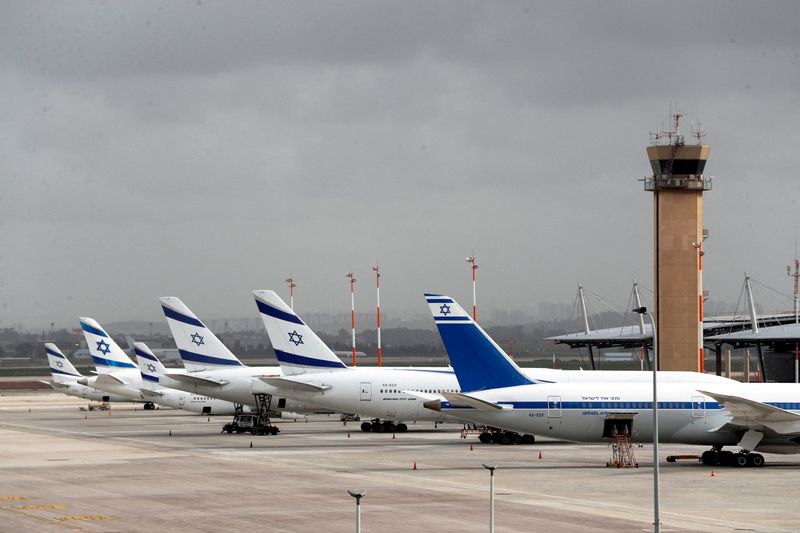Investing.com’s stocks of the week
By Carolyn Cohn, Noor Zainab Hussain and Steven Scheer
LONDON (Reuters) - Aviation war insurers have given notice to cancel cover for some airlines domiciled in Israel and Lebanon because of the conflict in the region, with some cancellations already taking effect, three industry sources with direct knowledge of the matter said.
Aviation war insurers based in Europe, the United States and the Lloyd's of London market can issue a 7-day notice of cancellation or other changes to terms and conditions in the event of a major conflict they feel will make the long-term insurance risk too great.
Insurers for Israeli flag carrier El Al Airlines, Israir and Arkia have previously said they can issue such notices due to the war between Israel and the Palestinian group Hamas. Israeli airlines have now received the notices, two sources told Reuters, without naming the airlines.
"War underwriters' appetite for continuing to cover these risks for no additional reward differs and some are now looking to withdraw cover, especially given the news the Israeli government has provided a backstop to cover flights," said Bruce Carman, chief underwriting officer at Hive Underwriters.
Israeli's parliamentary finance committee last week approved a plan to provide a state guarantee of $6 billion to cover insurance against war risks to Israeli airlines.
Spokespeople for Israeli airlines El Al and Arkia did not directly respond to questions from Reuters about whether insurers had served notice but said the government was providing all necessary coverage for them to continue operations safely.
A spokesperson for Israir said it had not been served notice by its insurers, but did not provide additional details. A spokesperson for Lebanese carrier Middle East Airlines did not immediately respond to requests for comment.
Israeli carriers have continued to fly while most foreign airlines have cancelled flights to Tel Aviv, expanding flights to bring back those travelling abroad and those called up to reserve service for the military.
Airlines normally take out two types of policy - an "all risks" policy which covers both regular damage to the hull and passenger liability, and a "war" policy to cover war or terror-related losses to the aircraft.
"Certain underwriters have not allowed or not provided insurance for war risk and other allied perils insurance for some operators," Garrett Hanrahan, Marsh's Global Aviation Leader, told Reuters.
"These operators did not have operational experience flying into Israel and not under conditions where there is a conflict taking place," he added.
Another of the insurers' biggest concerns is for aircraft stuck on the ground in conflict zones. Middle East Airlines this week said it will keep 5 of its 24 airplanes in Turkey, following rocket, missile and artillery exchanges between Israel and Hezbollah.
Airlines based outside Israel and Lebanon are not suffering from cancellations to their cover for the region but are facing other restrictions, two industry sources said.
"Insurers want regular updates - each airline has a different risk profile and therefore different risk mitigation strategies," said a spokesperson for insurance buyers' association Airmic's aviation group.
The airlines are not yet facing additional premiums for their scheduled flights, the sources said.
But they may be required to leave their aircraft on the ground at airports in Tel Aviv or Beirut for no more than three hours, for example, or to avoid refuelling stops at those airports, two sources added.
"If for whatever reason they (aircrafts) are delayed, they need to be communicating with underwriters," Hanrahan said.
Special flights to evacuate people from Israel would require a "material change" to an airline's policy and airlines are facing additional premium of between 0.05% and 0.1% of the value of the aircraft for those flights, one broking source said.
There could be up to 20 insurers on one policy and it may be hard to get them all to agree to cover a flight, sources said.
Norwegian Air cancelled a planned evacuation flight last week due to lack of insurance to fly via Tel Aviv, but later scheduled a new flight from Eilat in southern Israel.
